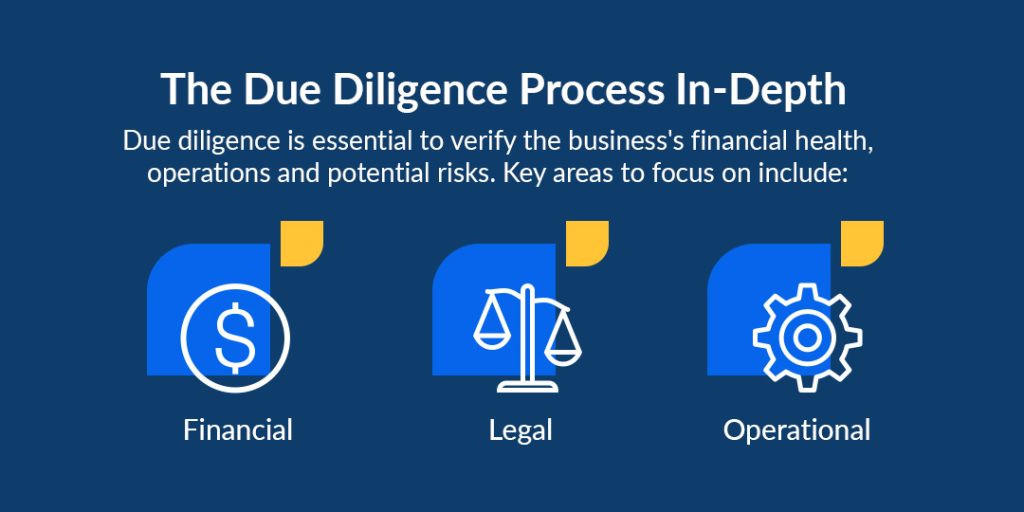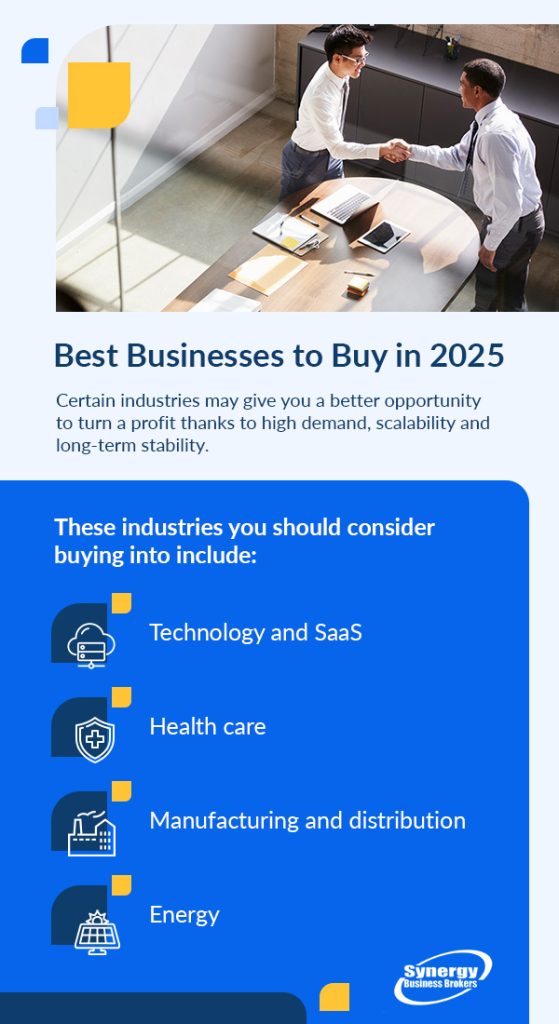
Blake Taylor
What Is the Best Way to Sell a Profitable Business?
Selling a profitable business is one of the most significant financial decisions you can make as a business owner. A …
7 MIN READ
Read More

Buying an existing business can be a smart way to enter the entrepreneurial world or expand your current operations. Instead of starting from scratch, you get an established brand, customer base and revenue stream.
Whether you are an entrepreneur looking to step into business ownership or an established owner ready to expand, choosing the right business requires a strategic approach. You need to define your goals, evaluate financials and negotiate the deal, to name just a few key considerations.
If you are considering entrepreneurship, you may be deciding between starting a business from the ground up or buying an existing one. While both paths can be rewarding, buying an established operation has some significant advantages that include a lower risk profile, better profitability and an existing customer base.
Starting a business from scratch takes a lot of time, money, trial and error. About 20% of new businesses fail within the first year, and up to 50% fail within five. Cash flow issues and ineffective marketing contribute to the risk of new business ventures, but you can bypass these when you purchase a profitable business. You get a company that has already proven its market viability, so there is no need to guess whether the business model works — it already does.
Revenue generation is one of the biggest challenges a new business faces. Many only start to break even after a few years, meaning they rely on outside funding to sustain operations. An established business is already generating cash flow. There is an established customer base, supplier relationships and often a proven sales process. You can start earning an income from day one.
Banks and investors are hesitant to fund unproven ideas, so many entrepreneurs rely on venture capital or personal finances like savings and credit cards. Lenders are much more willing to finance a business acquisition. Securing a loan through the Small Business Administration (SBA) or other financial institutions may be easier because the business has historical finances to prove its profitability, expenses and revenue.
Building a brand from scratch is challenging. You have to gain customer trust, compete with established organizations and be patient, as it can take up to six months or more for your operations to rank on Google and social media. When you buy an existing business, you also buy its brand equity — the goodwill, reputation and customer loyalty the business has already built. You inherit a company that customers already recognize and trust.
When you buy a business, you step into an optimized operation. Instead of focusing on proving a concept, you can focus on scaling, whether that is expanding product lines, entering new markets or improving efficiencies. Since the business is already making money, you may realize your return on investment (ROI) much faster than if you are starting from scratch.

Finding the right business is about aligning opportunities with your skills, financial goals and industry trends. From a self-assessment to a smooth transition, this is what you need to know about finding a business to buy into:
As you start assessing listings, ask yourself:
For example, if you are an experienced construction company owner, it makes sense to buy a business in the construction industry over manufacturing, where you have little or no expertise. If you want more flexibility, look for a fully operational business with a strong management team. This preexisting operational structure may better fit your needs than one requiring constant oversight.
Another important factor is your financial position. Business acquisitions typically need 20% down if you are financing through a bank or SBA loan. Understanding your risk tolerance and cash availability helps you filter through opportunities early on.
Once you identify your skills and interests, the next step is to research industries and find the right market fit. Analyze market trends by seeing if your industry revenue is growing or shrinking. Research the competitive landscape to ensure the market is not over-saturated, and take note of any technological changes or new regulations that could impact the business you are considering. Evaluate the industry’s typical profitability and profit margin and how long it takes for businesses to break even.
Are there recurring revenue models, like memberships or subscriptions, that make cash flow more predictable?
Industries like software-as-a-service (SaaS) have high margins and recurring revenue, while retail operates on thinner margins. A business in a market with high barriers to entry, such as one with complex supply chains or requiring specialized skills, may offer protection from competitors despite requiring more upfront work. Easy-to-enter markets often have high competition, making differentiation critical.
You can start the search when you know what type of business you are looking for. Businesses are listed on online marketplaces with platforms like Synergy Business Brokers, where you will find a range of companies across various industries. Working with a business broker gives you access to a wide range of opportunities and expert negotiation assistance.
Through networking and direct outreach, you can also find opportunities and exclusivity from business owners who have not officially listed their sales. Attending industry trade shows, business networking events or joining franchise groups can help you find these private listings. With Synergy Business Brokers, you can filter your search by industry, geography and price range. This structured approach makes it easier to identify businesses that meet your specific criteria.

Due diligence is essential to verify the business’s financial health, operations and potential risks. Key areas to focus on include:
There is also the business’s customer and market analysis to consider. What is the customer retention rate like? Do customers return, or is revenue dependent on constant new sales? Assess any competitive threats — are there emerging competitors that can impact profitability?
Once you are confident in a business, it is time to negotiate the price and terms, starting with a valuation. Most businesses are valued based on multiples of earnings, typically including Earnings Before Interest, Taxes, Depreciation and Amortization (EBITDA) or Seller’s Discretionary Earnings (SDE). Working with a professional will help you determine a fair price. With that amount in mind, you can move on to the deal structure.
Business purchases are typically structured in three ways. An asset purchase is where you buy assets like inventory, equipment and customer lists, but not liabilities. This is common when you find a small business to buy. There is also a stock purchase, where you buy shares of the company, inheriting assets and liabilities. Sometimes there is seller financing. In this model, the seller finances part of the deal, reducing the upfront cash needs. There are also bank financing possibilities.
Remember to negotiate both the price and terms. Earnouts, payments based on future performance or staggered payments can reduce your upfront financial strain if the seller is open to this.
After signing the purchase agreement, work on your transition plan:
While maintaining stability, look for low-risk improvements like improving the business’s digital marketing for better customer reach, negotiating better supplier deals and streamlining workflows to cut costs. Open communication and gradual transitions should be implemented to help retain key staff during this period.

Economic trends, technological advancements and shifting consumer behaviors continue to reshape the business landscape. Certain industries may give you a better opportunity to turn a profit thanks to high demand, scalability and long-term stability. These industries you should consider buying into include:
Many buyers worry about overpaying or struggling to manage their new business after the acquisition. These fears may be common, but they are not roadblocks. With the right approach, education, preparation and strategic decision-making, you can mitigate risks and confidently step into ownership.
Proper due diligence is crucial — work with a business broker, accountant or lawyer to review contracts, financials and operations. Look for consistent revenue, customer retention and a solid industry outlook. Don’t finalize any agreements until you’ve thoroughly addressed this part of the process.
Unexpected expenses like equipment repairs or customer churn are valid concerns. However, doing thorough financial due diligence and negotiating clauses in the purchase agreement can help mitigate these risks.
Many sellers offer training periods that help transition ownership smoothly. By taking over a functioning system with experienced employees, you have access to people who already know how things work.
Many loans, like SBA 7(a) loans, use the business’s assets, cash flow and goodwill as collateral. Lenders may be more willing to finance the purchase if it has consistent revenue and profitability.
Business valuation methods like EBITDA help ensure you pay a fair price. Hiring a business valuation expert can also help protect your new investment.
A reputable business broker can connect you with lenders experienced in business acquisitions, negotiate favorable seller financing terms and guide you through due diligence to ensure financial viability.
Buying a business can be a life-changing decision, but success comes from careful research, financial due diligence and smart negotiation. Whether you are a first-time entrepreneur or a seasoned business owner looking to expand into new markets, following the right steps and partnering with a reliable service provider can help you find the right opportunity with minimal risk.
At Synergy Business Brokers, we help buyers navigate this process with confidentiality, expert insights and a wide selection of businesses for sale. We specialize in several high-demand industries, including manufacturing, technology, distribution, health care, construction, transportation, and services. Our team is ready to guide you through every step of the process, from viewing our listed businesses for sale to signing a nondisclosure agreement (NDA) to let you access confidential business details and more.
We also assist business owners in selling their companies, aiding in offer negotiations, marketing and asking for price calculations. View our businesses for sale to find the best businesses to buy. When you find one of interest fill out our online NDA for more information.